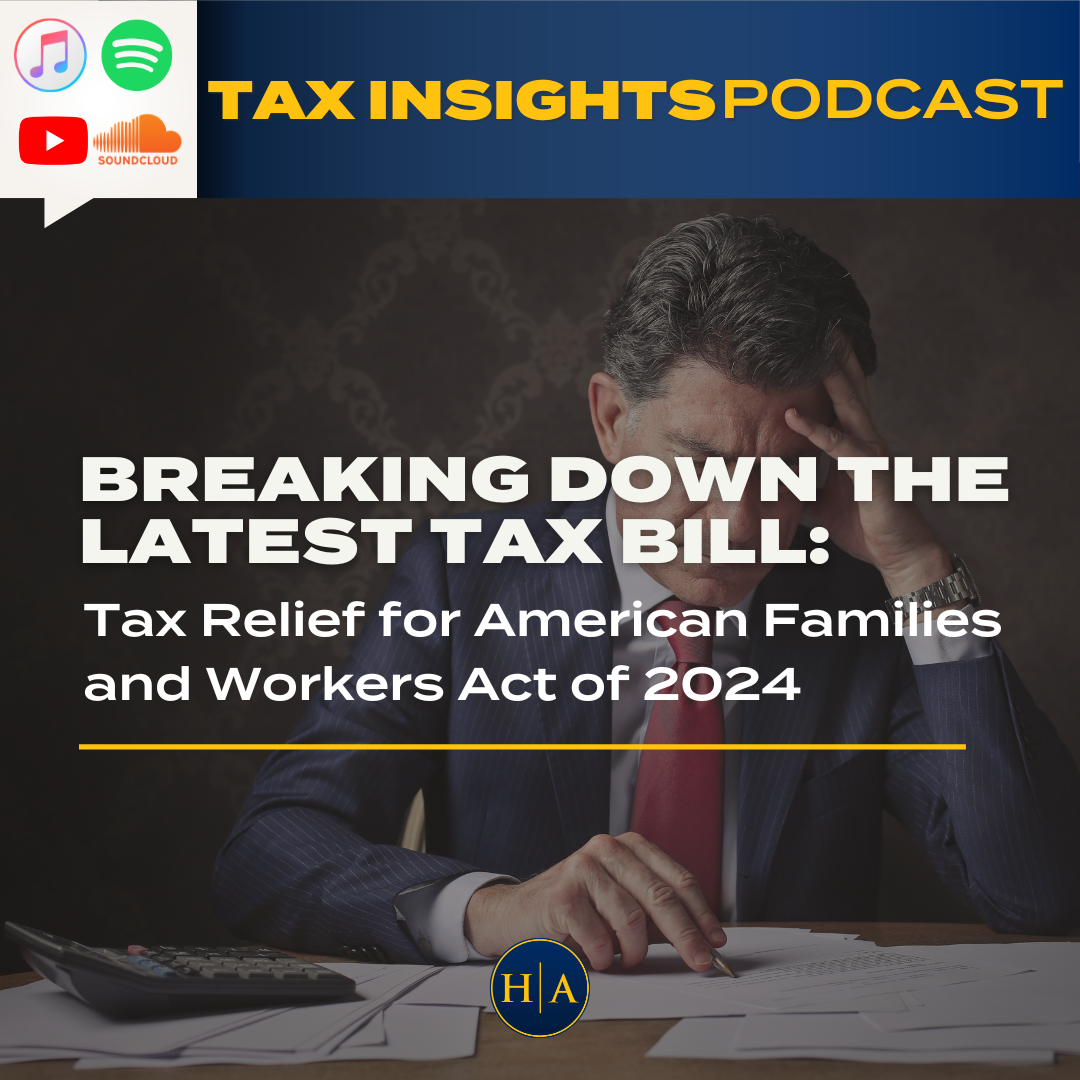Welcome to the Tax Insights Podcast, where we break down complex tax topics into bite-sized how-tos. In this episode of Tax Insights Podcast, Jeff Dvorachek uncovers the impact of a new tax bill on the upcoming tax season. Tune in as Jeff explores the three key provisions within the bill and how it impacts you!
The purposed tax bill would increase the child tax credit and restore critical research and development deductions. Dive into the latest Tax Insights Podcast as Jeff unravels the complexities of a new tax bill that could impact your 2023 and 2024 taxes.
Host: Well, it’s tax season, my friend. I would imagine that you guys are starting to get really busy, aren’t you?
Jeff: I think the floodgates have broken.
Host: Well, have a great season as they say oftentimes. Hey Jeff, on today’s program, there’s a new tax bill that is, is it a, I mean, has it been signed into law yet?
Jeff: It’s not, so it’s still in the relatively early stages, but it’s something that looks like this one in comparison to some others might actually have some legs.
Host: Alright, because I know that you now were talking before the show, but this is impacting obviously 2024 taxes and potentially 2023 even if you haven’t filed yet.
Jeff: It’s the fun part about being in public accounting Terry, they change the tax rules as they go even if it’s for last year.
Host: So, I mean, I’m just curious how would it impact 2023, let’s say you already did file but now that this new tax bill takes an impact. What happens in that situation?
Jeff: Yeah, so in that case you almost have to amend that tax return and as we think about this, you know this tax bill may even go as far back as 2022. So there may be a 2022 amended return it needs to be done if you want to take advantage of some of the provisions of this potential new tax bill.
Host: Alright, so let’s talk about that because I know that there are three provisions on this tax bill. Walk us through them.
Jeff: Yeah, the first one is on the research and development expenses. Now in the past when a company kind of developed a new product or a new process, in many cases they were just able to write off those expenses in the year that they incurred them. So, you know from 21 and before, you know if you had a $10,000 bill for putting together a new process, you could write that off in 2021. Well, the rules changed in 2022 and the rules changed to say that you can’t write that off anymore in 2022. You have to write that off over a five-year period. Now the company still gets a tax deduction they just get it at a much slower rate.
Host: Alright, why would they do that, like why would they try and say hey we have to do that over a slower period. What’s the benefit to that?
Jeff: Some of it is just pushing taxes into the current year and kind of pushing those deductions down the line. That’s really the biggest thing. But you know what this tax bill did? This tax bill said you know about that whole thing about 2022 and capitalizing and writing it off. Maybe we were just kidding. So, the new tax bill that they’re actually proposing says hey even in 2022 if you want to write those expenses off in the first year you can do that. But of course as we just talked about, everybody’s filed their 2022 return already. So that would require an amended return to fix that.
Host: You said that there were three provisions — that was the first one. The second one I know is bonus depreciation, walk us through this.
Jeff: That’s it. So for bonus depreciation in the past, we’ve always been able to depreciate, you know 100% of an asset via bonus depreciation, which means that if you buy a new piece of equipment this year you can write off that whole piece of equipment in the first year.
Host: Makes sense.
Jeff: The rules change for that in 2023, they said no. We’re only going to let you write off 80% of that and the other 20% has to be written off over a five or seven-year schedule. Well, of course this new tax bill comes along and the proposal says you know we were just kidding about that too. Starting in 2023 if this tax bill goes through you can once again write it all off in the first year. So you have fun stuff that we have to deal with.
Host: And the last one that we wanna talk about. Obviously, the employer retention credit, walk us through this one.
Jeff: Yeah, so we’ve talked a lot about the employer retention credit and about the fraud and everything that went on with that. So, you know when you have a new tax bill you have to find a way to pay for it and the way that the IRS or the way that the government decided to pay for those other two tax breaks is by potentially cutting off the employee retention credits as of January 31st. Now you had until April or until next year in order to get those filed but the IRS said you know there’s so much fraud out there that we’re going to cut that off here as of January 31st. So we’ll see if this all comes to fruition but that right now is what the proposed tax law says.
Host: A lot of great information here on today’s program. Jeff, how would our listeners reach out to you guys and know that this is your busy season but obviously if people have questions or would like to connect Hawkins Ash where do they go?
Jeff: I would go right to our website HawkinsAsh.CPA and go to that CPA HQ section.





